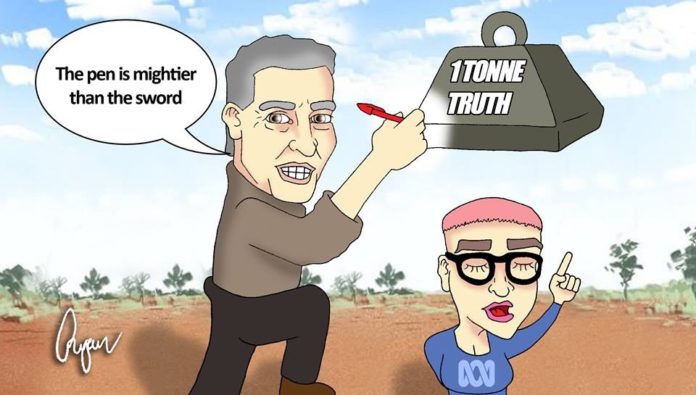
From an anonymous contributor:
I am a teacher working in a remote part of the Northern Territory. I’ve worked at several schools over the last several years. That is because the NT Department of Education usually, in the past few years, anyway, offers short contracts to teachers just starting out. So I’ve seen a good slice of the aboriginal experience in the Northern Territory.
I’m afraid I can’t offer specifics, because the Department is very strict about its teachers talking about their experiences on the internet. That is also the reason why I am writing this article anonymously.
Many children I’ve seen have suffered neglect and abuse, including sexual abuse, and abandonment. FAS-D (also known as foetal alcohol syndrome, caused by the mother drinking too much alcohol during pregnancy) is common. For example, at one school I worked at, the principal said that all of the children are either abused, or FAS-D, or both. At another school the principal told me that 95% of the kids have been abused. I’ve found that the word ‘abuse’ is somewhat euphemistic; sometimes it means physical assault, sometimes sexual assault.
Drunkenness is a problem in many communities, and of course contributes to family violence. Why else do you think so many aboriginal communities have been declared alcohol-free? Here’s a telling picture: at the entrance to one dry community, there was a sign saying that alcohol was forbidden in the community. In front of the sign, i.e. just outside the community, were hundreds and hundreds of discarded beer cans. The green and red VB can is ubiquitous.
Unemployment is rife. Plenty of aborigines do have jobs, but plenty don’t. Laziness and an unwillingness to travel contribute to that. It’s true that traditionally, aborigines have not had a culture of nine-to-fiving, so it can be a bit harder to get used to than for non-aborigines. But a man without a job is an idle man.
Children often come to school unfed (the schools usually provide food), wearing the same clothes they’ve had on all week, which are often dirty. Head lice are very common among the children, as are boils. If a child is tired or irritable during class, you ask them why, and chances are he or she stayed up very late, watching movies that are often not meant for children; or ‘there was some trouble in the community last night’, making it hard for kids to get a good night’s sleep. At least one child I knew went home after school and on more than one occasion found the house locked up and empty, the carers nowhere to be seen. Plenty of times I have heard that a child’s ‘real father’ is in prison.
I’ve seen more than that, and heard more still. But this small slice of my personal experience should be enough for now. Basically, there are problems in remote aboriginal communities. Statistics will back me up.
Now about Bill Leak’s cartoon last week. He nailed it. He absolutely nailed it. I thought, “Wow, someone is actually telling it how it is!” And it did not just mention bad parents, but also those aborigines who want to make things better for kids, too. Many aborigines, often older women in my experience, have the same attitude as the policeman in Leak’s cartoon.
Is it racist? No. The Left say it is because it portrays aborigines in a bad light, and thus is more like a simple insult. But there is a difference between insulting a person, and telling that person a harsh truth. The former is saying something unkind simply in order to upset another person because you don’t like that person. For example, racist scribbles on toilet walls. The latter is a form of compassion – it’s not called tough ‘love’ for nothing. Bill Leak’s cartoon is surely the latter. Do you honestly think the cartoon demonstrates that Bill Leak hates aborigines? Really? It’s not in the same class as some toilet wall screed.
If you are still not convinced that his cartoon is not racist, try comparing it to a genuine racist cartoon, where the cartoonist really does hold racist views. Try looking up some old Nazi cartoons, or Hezbollah cartoons. Have a squiz at some of the entries in Iran’s holocaust cartoon contest. Just see how different all of those feel to Bill Leak’s cartoon.
If you wonder why so many aboriginal children end up in juvenile detention, look no further than the environment in which the kids grow up. That environment is also a reason Aboriginal kids tend to do more poorly at school.
Bill Leak’s cartoon won’t have the slightest negative impact on aborigines’ way of life. I reckon the wisest aborigine would look at it and see how truthful it is. What will have an impact on aborigines’ way of life, the kids’ anyway, is the environment in which those kids live – communities that are rife with neglect, abuse, welfare dependency, drunkenness and hopelessness.
To finish, I have a few questions for any journalist or commenter who criticised Bill Leak by calling him a racist. Answer in the comments section, or in your own article, honestly:
1. Is there a significant problem with drunkenness, unemployment, family violence, neglect and abuse in aboriginal communities in the NT?
2. Do you think that a child raised in a community which has a lot of those problems is more likely to be a delinquent than a child raised in a community that lacks those problems?
3. Do you think that children who are happy, healthy, and balanced; who have a firm, correct understanding of right and wrong; and who have loving, responsible, mature, law-abiding parents as role models and carers are less likely to commit crimes and end up in juvenile detention than those children who lack those things?
4. To what extent will calling Bill Leak a racist fix the problems listed in question 1?
5. To what extent will calling Bill Leak a racist demonstrate to your like-minded peers that you yourself are not a racist, and therefore to be admired?
6. How would you change things so that fewer aboriginal children end up in juvenile detention, while at the same time keeping law-abiding, taxpaying citizens safe from dangerous youths?
7. If you were Bill Leak, possessing cartooning skills and a platform in a widely-read national newspaper, and you knew that many remote aboriginal communities in the NT had those problems listed in question 1, but not enough people were talking about them or even knew about them, and you thought up the perfect way to get that message across in a cartoon, would you then draw that cartoon? Or would you censor yourself, worrying that some people might call you a racist?










